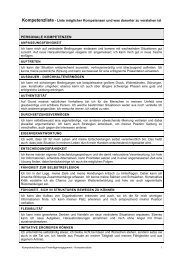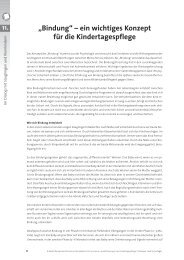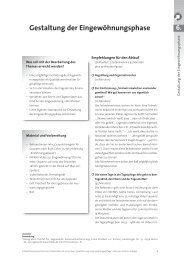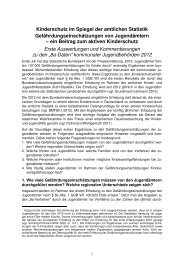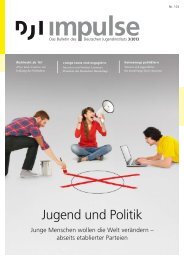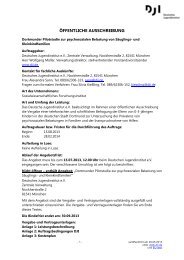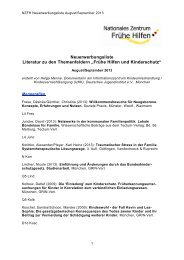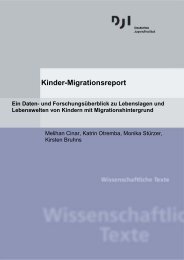Assessing the effects of informal learning on occupational compe ...
Assessing the effects of informal learning on occupational compe ...
Assessing the effects of informal learning on occupational compe ...
You also want an ePaper? Increase the reach of your titles
YUMPU automatically turns print PDFs into web optimized ePapers that Google loves.
There are numerous more or less similar systems – e.g., <str<strong>on</strong>g>the</str<strong>on</strong>g> distincti<strong>on</strong> between<br />
specialist <strong>compe</strong>tence, methodological <strong>compe</strong>tence, social <strong>compe</strong>tence,<br />
and self-<strong>compe</strong>tence (Kauffeld/Grote/Frieling 2003, pp. 261–2). Ano<str<strong>on</strong>g>the</str<strong>on</strong>g>r<br />
<strong>compe</strong>tence class that is occasi<strong>on</strong>ally defined is c<strong>on</strong>tent-related basic knowledge,<br />
i.e. ‘natural-science, social-science, and ethical basic knowledge in <str<strong>on</strong>g>the</str<strong>on</strong>g><br />
fields <str<strong>on</strong>g>of</str<strong>on</strong>g> history, literature, educati<strong>on</strong>, sociology, politics, philosophy, ma<str<strong>on</strong>g>the</str<strong>on</strong>g>matics,<br />
biology, technology, etc.’ (Edelmann/Tippelt 2004, p. 8).<br />
Important in <str<strong>on</strong>g>the</str<strong>on</strong>g> present c<strong>on</strong>text is <str<strong>on</strong>g>the</str<strong>on</strong>g> fact that <str<strong>on</strong>g>the</str<strong>on</strong>g> multidimensi<strong>on</strong>ality <str<strong>on</strong>g>of</str<strong>on</strong>g><br />
<str<strong>on</strong>g>the</str<strong>on</strong>g> c<strong>on</strong>cept <str<strong>on</strong>g>of</str<strong>on</strong>g> <strong>compe</strong>tence, which goes bey<strong>on</strong>d merely specialist and<br />
methodological formal qualificati<strong>on</strong>s and includes <str<strong>on</strong>g>the</str<strong>on</strong>g> field <str<strong>on</strong>g>of</str<strong>on</strong>g> <str<strong>on</strong>g>informal</str<strong>on</strong>g>ly<br />
acquired <strong>compe</strong>tences (see below) means that it is also <str<strong>on</strong>g>of</str<strong>on</strong>g> interest for our<br />
target group (disadvantaged young people), who might with slight exaggerati<strong>on</strong><br />
be described as <str<strong>on</strong>g>the</str<strong>on</strong>g> ‘victims’ <str<strong>on</strong>g>of</str<strong>on</strong>g> a <strong>on</strong>e-dimensi<strong>on</strong>al and <strong>on</strong>e-sided<br />
emphasis <strong>on</strong> cognitive achievements and formal qualificati<strong>on</strong>s in pers<strong>on</strong>nel<br />
selecti<strong>on</strong>. The introducti<strong>on</strong> <str<strong>on</strong>g>of</str<strong>on</strong>g> a c<strong>on</strong>cept <str<strong>on</strong>g>of</str<strong>on</strong>g> <strong>compe</strong>tence that has been<br />
expanded to include social aspects, and <str<strong>on</strong>g>the</str<strong>on</strong>g> development <str<strong>on</strong>g>of</str<strong>on</strong>g> methods <str<strong>on</strong>g>of</str<strong>on</strong>g> qualitatively<br />
recording <str<strong>on</strong>g>the</str<strong>on</strong>g> processes <str<strong>on</strong>g>of</str<strong>on</strong>g> <strong>compe</strong>tence development (Arbeitsgemeinschaft<br />
QUEM 1999) in <str<strong>on</strong>g>the</str<strong>on</strong>g> n<strong>on</strong>-company and n<strong>on</strong>-school envir<strong>on</strong>ment<br />
(family, peers, etc.), are <str<strong>on</strong>g>the</str<strong>on</strong>g>refore associated with hopes and expectati<strong>on</strong>s<br />
with regard to better occupati<strong>on</strong>al integrati<strong>on</strong> <str<strong>on</strong>g>of</str<strong>on</strong>g> disadvantaged young people<br />
and adequate c<strong>on</strong>siderati<strong>on</strong> <str<strong>on</strong>g>of</str<strong>on</strong>g> <str<strong>on</strong>g>the</str<strong>on</strong>g>ir (social) <strong>compe</strong>tences and resources.<br />
However, this approach presupposes that this procedure will actually be<br />
capable <str<strong>on</strong>g>of</str<strong>on</strong>g> <strong>compe</strong>nsating to some extent for <str<strong>on</strong>g>the</str<strong>on</strong>g> ‘<strong>compe</strong>titive disadvantages’<br />
that <str<strong>on</strong>g>the</str<strong>on</strong>g>se young people have in <str<strong>on</strong>g>the</str<strong>on</strong>g> training-post market and job market.<br />
This desired effect also assumes that <str<strong>on</strong>g>the</str<strong>on</strong>g>se previously disregarded, <str<strong>on</strong>g>informal</str<strong>on</strong>g>ly<br />
acquired social <strong>compe</strong>tences in <str<strong>on</strong>g>the</str<strong>on</strong>g> target group can be adequately proved<br />
and measured as well. In <str<strong>on</strong>g>the</str<strong>on</strong>g> present state <str<strong>on</strong>g>of</str<strong>on</strong>g> affairs, this is where <str<strong>on</strong>g>the</str<strong>on</strong>g> greatest<br />
need for research and acti<strong>on</strong> lies, since <str<strong>on</strong>g>the</str<strong>on</strong>g> traditi<strong>on</strong>al procedures for<br />
measuring <strong>compe</strong>tence – in relati<strong>on</strong> to young people with special needs as<br />
well – are usually results-oriented (although not universally; see below); i.e.,<br />
when measuring and establishing <strong>compe</strong>tence, <str<strong>on</strong>g>the</str<strong>on</strong>g>y do not distinguish between<br />
<strong>compe</strong>tences acquired through formal or <str<strong>on</strong>g>informal</str<strong>on</strong>g> (or n<strong>on</strong>-formal) <str<strong>on</strong>g>learning</str<strong>on</strong>g>.<br />
There is a broad c<strong>on</strong>sensus today that <str<strong>on</strong>g>the</str<strong>on</strong>g> development <str<strong>on</strong>g>of</str<strong>on</strong>g> <strong>compe</strong>tence<br />
depends <strong>on</strong> ‘c<strong>on</strong>tinuous interlocking <str<strong>on</strong>g>of</str<strong>on</strong>g> instituti<strong>on</strong>al and self-organized<br />
teaching and <str<strong>on</strong>g>learning</str<strong>on</strong>g> phases’ (Edelmann/Tippelt 2004, p. 8). However,<br />
mainly for methodological reas<strong>on</strong>s, <str<strong>on</strong>g>the</str<strong>on</strong>g>re has so far been practically no success<br />
in precisely proving and determining <str<strong>on</strong>g>the</str<strong>on</strong>g> qualitative and quantitative<br />
c<strong>on</strong>tributi<strong>on</strong> made by <str<strong>on</strong>g>informal</str<strong>on</strong>g> <str<strong>on</strong>g>learning</str<strong>on</strong>g> to <str<strong>on</strong>g>the</str<strong>on</strong>g> acquirement <str<strong>on</strong>g>of</str<strong>on</strong>g> occupati<strong>on</strong>ally<br />
relevant <strong>compe</strong>tence in <str<strong>on</strong>g>the</str<strong>on</strong>g> individual case. The complex interacti<strong>on</strong>s between<br />
formal and <str<strong>on</strong>g>informal</str<strong>on</strong>g> (or n<strong>on</strong>-formal) <str<strong>on</strong>g>learning</str<strong>on</strong>g> are difficult to grasp<br />
methodologically. In Germany (and probably in o<str<strong>on</strong>g>the</str<strong>on</strong>g>r countries as well),<br />
‘<str<strong>on</strong>g>the</str<strong>on</strong>g>re is above all a lack <str<strong>on</strong>g>of</str<strong>on</strong>g> l<strong>on</strong>g-term studies in which <str<strong>on</strong>g>the</str<strong>on</strong>g> <str<strong>on</strong>g>effects</str<strong>on</strong>g> <str<strong>on</strong>g>of</str<strong>on</strong>g> family<br />
c<strong>on</strong>texts <strong>on</strong> acquiring <strong>compe</strong>tence, developing <strong>compe</strong>tence, and educati<strong>on</strong>al<br />
processes have been analysed’ (Rauschenbach et al. 2004, p. 315). Similar<br />
research deficits also apply to o<str<strong>on</strong>g>the</str<strong>on</strong>g>r potential locati<strong>on</strong>s, forms, and methods<br />
<str<strong>on</strong>g>of</str<strong>on</strong>g> <str<strong>on</strong>g>informal</str<strong>on</strong>g> <str<strong>on</strong>g>learning</str<strong>on</strong>g>.<br />
7 <str<strong>on</strong>g>Assessing</str<strong>on</strong>g> <str<strong>on</strong>g>the</str<strong>on</strong>g> <str<strong>on</strong>g>effects</str<strong>on</strong>g> <str<strong>on</strong>g>of</str<strong>on</strong>g> <str<strong>on</strong>g>informal</str<strong>on</strong>g> <str<strong>on</strong>g>learning</str<strong>on</strong>g> <strong>on</strong> occupati<strong>on</strong>al <strong>compe</strong>tences <str<strong>on</strong>g>of</str<strong>on</strong>g> disadvantaged young pers<strong>on</strong>s





